Welcome to our March Substack Newsletter ‘News and Views’ which highlights the theme Water and Peace, the theme of World Water Day celebrated annually on 22 March. It is most topical theme, especially given the conflicts now continuing around the globe.
The Academy focuses on sharing its expertise in international water to enhance opportunities for improved transboundary water cooperation. As part of this commitment the Academy will convene a World Water Day event in Shenzhen China looking at the various dimensions of ‘Water and Peace’ through a research lens. Our global Affiliates are also contributing to a forthcoming Special Issue of scholarship in the Journal of Energy and Natural Resources, which will examine the notion of ‘community’ in the transboundary water context.
Watch this space for more on the Academy’s upcoming meeting convened in collaboration with the University of Edinburgh law school, a two-day research event focusing on the international law topics of ‘Community’ and ‘Convergence’, building on our work in these fields. We continue to advance our mission to build a community of scholars that contribute to enhanced transboundary water cooperation through international water law.
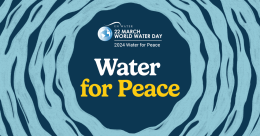
Focus for 2024 – Advancing the Academy’s research on the international law concepts of ‘Convergence’, and ‘Community’ in the context of transboundary water cooperation
Participants at the Wuhan meeting in September 2023 proposed creating a research project on Convergence to explore how convergent rules of international law contribute to transboundary water cooperation and the Water Action Agenda created at the UN Water Conference in New York (March 2023) Prof. Owen McIntyre, founding Affiliate of the Academy, leads this work, supported by Prof. Lingjie Kong and Prof. Patricia Wouters. This topic will be featured at our 2024 University of Edinburgh conference, 25-26 June 2024.
Special Issue of the Journal of Energy and Natural Resources Law
The Academy will produce a special issue of the Journal of Energy and Natural Resources Law (Taylor and Francis). Prof. Don Smith is the Managing Editor for the journal, welcoming the Director of the Academy Prof. Patricia Wouters, as well as Academy Affiliates Dr. David Devlaeminck and Dr. Ana-Maria Daza Clark alongside him as guest editors for this Special Issue. This collection of scholarship gathers the research of the Academy’s global affiliates on international water law with a closer examination of the concept of ‘community’ as it relates to transboundary water.
Working Group on Water Law – Global Forum on Law, Justice and Development, World Bank
Dr. Christina Leb, Affiliate of the Academy, Senior Counsel at the Environment and International Law Department of the World Bank leads a new Water Law Working Group under the Global Forum on Law, Justice and Development (GFLJD) housed at the World Bank. The Academy Affiliates contribute to this special initiative with a view to sharing our expertise in international water law.
Meetings 2024
In 2024, IWLA will hold expert meetings in both China and the UK, with a central theme on convergence and community. Here is a selection of some of the meetings in 2024 which Academy affiliates have or attended or will attend.
Centre for Water Law, Policy and Science, under the auspices of UNESCO, Symposium, February 22, Dundee, UK.
This UNESCO Category II Centre, hosted by the University of Dundee, recently held a wide-ranging research symposium, attended by water experts from this, and other, Category II UNESCO Centres. IWLA Affiliate Andrew Allan presented his recent work on both corporate disclosure and water, and on the rights of nature (with Prof. Chris Spray), which was attended by around 60 people across multiple disciplines.
The Global Workshop on Droughts in Transboundary Basins,
26-27 February 2024, Geneva Switzerland, organised by the UNECE with several partners: the Netherlands and Switzerland, in cooperation with the UN Convention to Combat Desertification, the UN Office for Disaster Risk Reduction, the World Meteorological Organisation and the International Network of Basin Organisations.
Expert Consultation on Transboundary Water Cooperation and Climate Change in view of the preparation of the Third progress report on SDG indicator 6.5.2
UNECE and UNESCO, February 29, 2024, Geneva, Switzerland
Launch of the 2024 UN World Water Development Report: Water for Prosperity and Peace, which will be released on World Water Day, 22 March, at the UNESCO Headquarters in Paris.

Research Workshop on Transboundary Water Governance – time to be announced, Venue: TB555, The Chinese University of Hong Kong, Shenzhen Campus, in collaboration with the International Water Law Academy
Originally scheduled for World Water Day, in Shenzhen, China, this event will now take place later in the year at a time to be announced.
An inaugural Research Workshop on Transboundary Water Governance focusing on the link between water resources and global peace and stability under three themes:
Theme 1: Sovereignty, extraterritoriality and international cooperation
Theme 2: Hydro-social territories and the ‘Community of Communities’
Theme 3: Roundtable Discussion – concluding remarks and research outcomes
10th World Water Forum, World Water Council, Bali, Indonesia,
May 18 - 24, 2024
IWLA meeting – Convergence and Community, University of Edinburgh
Edinburgh, UK, June 25-26 , 2024
International Water Association (IWA) World Water Congress and Exhibition 2024 Toronto, Canada, August 11 - 15, 2024
World Water Week 2024, Bridging Borders: Water for a Peaceful and Sustainable Future, Stockholm, Sweden, August 25 - 29, 2024
Meet our Affiliates - Interviews with Dr. Susanne Schmeier
and Ms. Zaki Shubber

Dr. Susanne Schmeier is the Head of the Water Governance Department and an Associate Professor of Water Law and Diplomacy at IHE Delft Institute for Water Education (IHE Delft). Her research, teaching and advisory activities focus on water resources governance and the role of agreements and basin organizations, negotiation and conflict resolution, as well as sustainable management of ecosystems linked to water resources including the management of mountain eco-regions and source-to-sea approaches and biodiversity.
Managing water conflicts and fostering water for peace:
The role of international water law
The conflict resolution role of international water law is indeed important. Specific international water law principles can guide the development of peaceful resolutions to conflicts over shared water resources. Conflicting parties as well as external actors then often invoke international water law principles that should guide states towards a peaceful settlement of the existing conflict, as required under general international law, including the UN Charter, but also under various water law frameworks specifically. The various disputes that were addressed by international courts and tribunals, most recently e.g. the Dispute over the Status and Use of the Waters of the Silala (Chile v. Bolivia) at the International Joint Commission, or the Indus Waters Kishenganga Arbitration (Pakistan v. India) at the Permanent Court of Arbitration , illustrate this; as do solutions that have been found through political means and negotiation forums.
Another, potentially even more important role of international water law is, however, often overlooked: international water law’s role in guiding states’ behaviour over their shared water resources in a manner that prevents the emergence of disagreements (or at least the escalation into full-fledged conflicts). Aspiring to ensure equitable and reasonable utilization of shared water resources and to prevent significant harm on co-riparian states in the use and the management of shared water resources and committing to do so on the basis of jointly agreed upon principles, norms and rules – whether at the global or at the basin level – builds an environment that supports cooperation and prevents (the escalation of) conflict.
An example where international water law and some of its specific substantive and procedural principles help to prevent conflicts can be found in the Mekong River Basin, where the prior notification and consultation process, in spite of the various challenges it faced, ensured that a complex disagreement did not escalate into a full-fledged conflict in the way it did in other basins facing more or less the same setting and challenge, such as the Grand Ethiopian Renaissance Dam conflict in the Nile River Basin, or the Rogun Dam conflict in the Aral Sea Basin.
This forecasting and preventative function of international water law is even more important when it comes to using water resources as a means for promoting peace – not only within but also beyond the water sector. Harvesting water’s potential as a source of peace requires that states engage in long-term cooperative behaviour that is based on a rules-based order – exactly what international water law attempts to do. In the Sava River Basin, for instance, it was states’ commitment to establishing a rules-based order over shared water resources – with the Framework Agreement on the Sava River Basin and the International Sava River Basin Commission – which built trust between countries that had just come out of a war among each other and thus paved the way for regional cooperation in other issue areas as well.
The upcoming World Water Day with its focus on water and peace is therefore an opportunity to recall the importance international water law has not only for addressing disagreements and conflicts over shared water resources once they have occurred, but especially for ensuring long-term cooperative state practice that benefits both shared watercourses and the ecosystems and people depending on them as well as regional stability and peace more broadly. It should also serve as a reminder to us water law scholars to play our role in ensuring that rules-based cooperation over shared water resources prevails over increasingly common unilateral approaches that we are currently observing in a changing world.
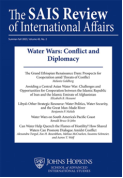
Dr. Schmeier co-authored an article in 2023 summer/fall issue of The SAIS Review of International Affairs, Can Water Help Quench the Flames of Hostility? How Shared Waters Can Promote Dialogue During Conflict.
https://muse.jhu.edu/article/918646
She is also the author of an article related to the theme of water diplomacy:
International Water Law Principles in Negotiations and Water Diplomacy
Part of: Interstate Disputes Over Water Rights
Published online by Cambridge University Press: 24 May 2021
American Journal of International Law, Susanne Schmeier https://www.cambridge.org/core/journals/american-journal-of-international-law/article/international-water-law-principles-in-negotiations-and-water-diplomacy/B4B6E3AC4B49A90E974D233DAA9DDFA8

Ms. Zaki Shubber is a lawyer specialising in national and international water law, in conflict resolution and in strategic foresight. She is about to complete her doctoral research at Queen Mary University of London on international law and the concept of uncertainty around shared freshwater resources. Ms. Shubber worked as a lecturer in law and water diplomacy at the IHE Delft Institute for Water Education in the Netherlands until 2021. She is currently a member of the Emerging Scholars Initiative (ESI) of the International Water Law Academy.
What contribution can international water law make to peace building?
Water is a precious resource, which has caused disputes over millennia and risks continuing to do so given the increasing pressure on demand and unpredictable water availability due to climate change. Because it crosses physically international borders in its fluid state above and below ground, it falls within scope of international law, which holds the keys to its peaceful management and sharing. It does so in three ways: as a preventive tool, as a dispute management instrument and as a framework of reference for judicial dispute settlement.
By setting out a body of substantial and procedural rules, international water law offers substantive and procedural normative guidance to riparian States on how to jointly share and manage their shared freshwater resources. Whether or not they have entered into specific agreements, fundamental principles of international water law, including the principle of equitable and reasonable utilisation, apply to all States because they form the core of customary international water law, a point stressed by the International Court of Justice in its 2022 decision on the Chilean-Bolivian Silala dispute.
Procedural elements such as notification, consultations and institutions facilitate interactions between countries as they make plans for the management of shared rivers, lakes and groundwater bodies and provide them with platforms to engage with each other in an effort to avoid a resulting dispute. Parties to the 1997 Convention on the Non-navigational uses of International Watercourses and to the 1992 Convention on the Protection and Use of Transboundary Watercourses and International Lakes will find detailed rules on this in these universal legal instruments provide. Finally, if negotiations between disputing countries, with or without the assistance of third parties, are unsuccessful and proceed to adjudication, arbitrators and judges will be referring to relevant tenets of international water law to decide the case as attested by the judgments of the PCIJ, ICJ and arbitration tribunals.
Today, many basins around the world have agreements in place that enable countries to interact, avoid disputes and build peace. Some notable examples include the 2002 Framework Agreement on the Sava River Basin between Bosnia and Herzegovina, Croatia, Serbia, and Slovenia, which brought together countries that had previously been at war with each other. However, even if customary international water law applies worldwide, its principles and those of the two conventions need to be operationalised at basin level, which is still lacking in many regions of the world. Efforts are therefore required to enable international water law to strengthen and increase its impact on the peaceful management of international hydrological resources and more broadly to peace building.
International Water Law Academy - Research and Publications
New publications


The Challenge of Crafting a Global Regime for Plastic Pollution,
The Georgetown Journal of International Affairs, Owen McIntyre,
February 28, 2024

Dr. Yang Liu, Ph.D., graduated from the Faculty of Law and Criminology, Ghent University, and is a postdoctoral fellow at the International Water Law Academy, China Institute of Boundary and Ocean Studies, Wuhan University. Dr. Liu recently participated in a number of meetings attended or hosted by the Academy including: the IUCN Annual Colloquium of the IUCN Academy of Environmental Law at the University of Eastern Finland Joensuu, Finland July 31-August 4, 2023, the International Water Resources Association World Water Congress in Beijing, 11-15 September 2023 and the launch of the Academy in Wuhan, September 15-16 2023.
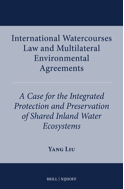
https://brill.com/display/title/64932
February 2024

A legal analysis of the interinstitutional duty to cooperate in international water law, 1 February 2024, Yang Liu
https://doi.org/10.1111/reel.12530
Publications related to peace and conflict resolution
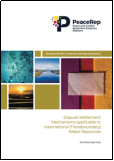
PeaceRep: The Peace and Conflict Resolution Evidence Platform
Dispute Settlement Mechanisms applicable to international (Transboundary)
Water Resources, 2022, Ana Maria Daza-Clark, School of Law, University of Edinburgh
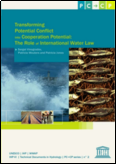
Transforming Potential Conflict into
Cooperation Potential
The Role of International Water Law
Patricia Wouters, Sergei Vinogradov and Patricia Jones
UNESCO, Technical Documents in Hydrology, PC-CP Series, 2003
https://unesdoc.unesco.org/ark:/48223/pf0000133258
Climate change can create disruption and insecurity in communities affected by droughts, forest fires and floods. Increasing hydropower can be one of the strategies to help reduce carbon emissions. Frontiers in Climate recently published an issue on the research topic: Doubling hydropower by 2050 - What about the transboundary dimension? Several affiliates published articles in this issue - Mara Tignino, Susanne Schmeier, Dinara Ziganshina and Owen McIntyre. Their articles can be found in the link below. https://www.frontiersin.org/research-topics/30628/doubling-global-hydropower-capacity-by-2050---what-about-the-transboundary-dimension/articles
The article below with a focus on China is also a part of the series:
Frontiers in Climate - Open Access:
China’s transboundary hydropower development at home and abroad: exploring the regulatory interface between international water law and international economic law, January 23, 2024, (Patricia Wouters, Ana Maria Daza-Clark and David J Devlaeminck). https://www.frontiersin.org/articles/10.3389/fclim.2023.1302103/full
We look forward to our collaboration in 2024!

Communications Team
Ms. Dale Campbell, Daniel Gilbert, Dr. Yang Liu, Ms. Tian Yunhe
Affiliates – share your news with us for future issues of
Substack News & Views, email us at: Dale.IWLA@proton.me
![]() Tel: 86-027-68756726
Tel: 86-027-68756726
![]() Address: Wuhan University China Institute of Boundary and Ocean Studies (CIBOS), P.R. China,
Address: Wuhan University China Institute of Boundary and Ocean Studies (CIBOS), P.R. China,
© International Water Law Academy. All Rights Reserved.